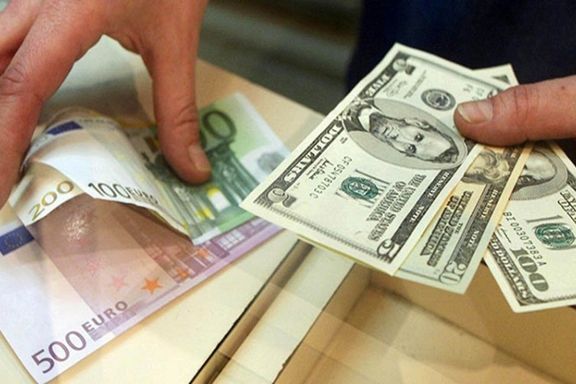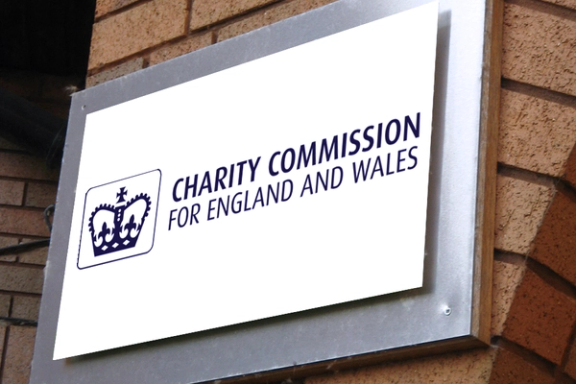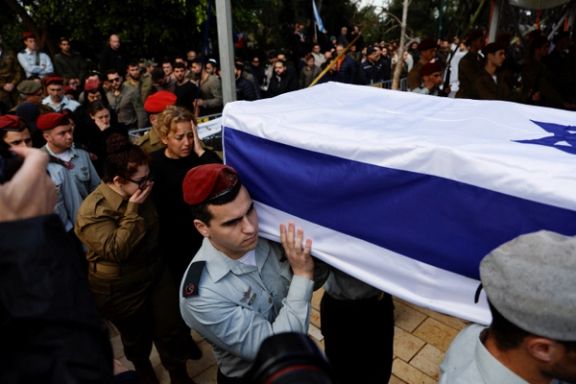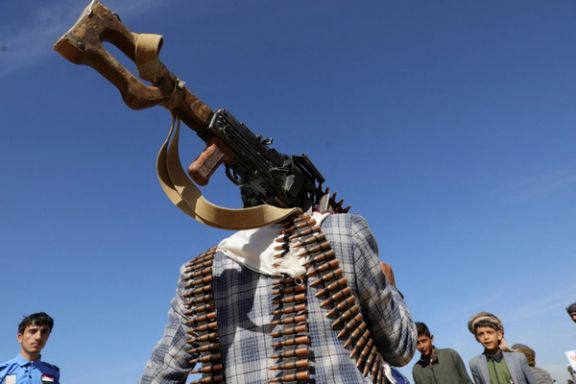Iran's Rial Falls 10% In Less Than A Month Amid Regional Tensions

Iran’s rial has fallen 10 percent since early January as tensions have risen in the region, with concerns rising about possible hostilities with the US or Israel.

Iran’s rial has fallen 10 percent since early January as tensions have risen in the region, with concerns rising about possible hostilities with the US or Israel.
On Tuesday the US dollar rose to more than 550,000 rials, which means the Iranian currency has fallen 13-fold since 2018, when the United States exited the JCPOA nuclear deal and imposed sanctions on Iran’s oil exports and international banking.
The euro hit 600,000 rials and the British pound traded at 700,000 rials in Tehran's free currency market, which despite some official exchange rates, reflects real exchange rates.
Although during the Biden administration the sanctions have not been rigorously enforced and Iran has been able to somewhat recover its oil exports, the country’s financial situation remains precarious.
The rials fall quickened last week, when Iran fired ballistic missiles at targets in Iraq and Pakistan, claiming retaliation against Israel and terrorists. Pakistan retaliated by airstrikes on targets in Iran, raising concerns about some kind of war breaking out with neighbors, or with the United States and Israel. Already tensions were high because of Iran-backed Houthis attacking commercial vessels in the Red Sea.
The annual inflation rate is at least 50 percent, with rial’s fall signaling higher inflation in the months to come. Monthly salaries for workers are less than $200 a month, as inflation rises faster than salaries in a depressed economy. There have been work stoppages and protests in many sectors, including oil and gas production platforms and refineries. Many essential goods such as wheat and animal feed are imported and rial’s fall signals higher consumer prices.

The UK’s Charity Commission is investigating videos featuring antisemitic speeches by Iranian generals delivered to British students.
The videos include "death to Israel" chants recorded at a UK Islamic charity's premises, the BBC reported.
Two of the videos also showcase talks by members of Iran's Islamic Revolutionary Guard Corps (IRGC), with one speaker describing an apocalyptic war against Jews and denying the Holocaust.
Concerns are mounting over the potential radicalization of UK Muslims by the IRGC and security services have issued warnings regarding possible incitement to violence and plots on British soil. The IRGC, known for its involvement in kidnap and assassination plots in the UK, exerts control over Iran's foreign covert operations and provides support to militant groups such as Hamas, Hezbollah, and the Houthis.
The commission's chair, Orlando Fraser, has previously warned that charities must not "become forums for hate speech" or extremism. The Charity Commission has the power to investigate, sanction or close down charities which breach the regulations.
In an Instagram Live session from Iran in September 2020, IRGC commander Hossein Yekta urged students to become "soft-war officers." Another video showed former IRGC commander Saeed Ghasemi falsely denying the Holocaust and discussing an apocalyptic war, suggesting British students could participate to "end the life of oppressors, occupiers, Zionists, and Jews worldwide."
The chair of the UK Foreign Affairs Committee, Alicia Kearns, has called for the proscription of the IRGC, expressing concerns about the potential impact of the group's activities in the country, citing them as “brazen act of radicalization.”
Last year, the UK Home Secretary said the IRGC was the single biggest threat to the UK while tens of IRGC plots had been foiled as revealed by MI5, at least 10 in 2022 and more during 2023, including threats to Iran International's staff.

Iran's ruling hardliners have crushed the election hopes of reformists and moderates in the parliamentary vote on March 1 by disqualifying nearly all their candidates.
Javad Heravi, the spokesman for the Moderation and Development Party, closely associated with Former President Hassan Rouhani and Former Vice President Mohammad Baqer Nobakht, announced on Monday that very few candidates have been approved to run. Other likeminded parties also do not have enough approved candidates to form a coalition with them.
In Heravi's words, "Practically, we are not players any longer," indicating that one of the most significant moderate parties in Iran will not participate in the elections. He added, "We are not to be blamed if we do not have a list of candidates for the election."

Iran's elections are not free from the start, with stringent vetting processes conducted by the interior ministry and the Guardian Council. This process has become increasingly political since 2020, resulting in the rejection of most non-hardliner candidates. As a result, hardliners, who are loyal to Supreme Leader Ali Khamenei, dominate the elections.
This situation effectively means that hardliners have already predetermined who can run and win in the elections, as nearly all ultraconservative candidates have passed the Guardian Council's scrutiny.
The party also criticized Iran's foreign policy, citing recent missile attacks on neighboring countries and stating that it has left voters concerned about the upcoming elections. Additionally, Iran’s 50-percent annual inflation rate and economic crisis have added to people's anxieties in the weeks leading up to the election.
Heravi explained that the Majles (parliament) cannot bring about positive change without elected lawmakers, and this can only happen with a high-turnout election. The party currently has 40 candidates remaining after the vetting process, but it will not release a candidate list unless it can field enough candidates for all constituencies in the country.
Furthermore, the party's spokesman noted that state television and the government appear to treat the elections as a competition among conservatives, and many former lawmakers, including those close to former Majles Speaker Ali Larijani, have been disqualified by the Guardian Council. Heravi emphasized, "Party members and others cannot expect anything from us while we have not been given a chance to compete."
Media reports indicate, the Guardian Council has not yet finalized the vetting results for 26 current members of the parliament and dozens of former lawmakers who have contested their disqualifications.
A former senior lawmaker, who has been disqualified by the Guardian Council, is Heshmatollah Falahatpisheh, the former head of the Iranian parliament and commentator who regularly writes about Iran's foreign policy with a critical view.
Meanwhile, Hadi Tahan Nazif, the spokesman for the Guardian Council has said that 12,033 candidates have been approved to run in the upcoming election. He confirmed that 26 incumbent MPs, as well as tens of former lawmakers, have been rejected. However, he added that the Guardian Council will soon release one more list of qualified candidates.
In the face of public reluctance to vote and the lack of popular support for participating in the election, the government has mobilized clerics and young seminarians to encourage voter turnout. Seminary students have formed a group called "Forty Days of Advice" to motivate people in the 40 days leading up to the election. However, clerics do not enjoy significant popularity in Iranian society, which poses a challenge to this propaganda effort.
A cleric, Jalal Razavi Mehr, the head of the Association of Qom Seminary Students has said that voting in the election is as important as honoring the chastity of one's wife and daughters.

As twenty-four Israeli soldiers were killed in Israel's worst day of losses in Gaza, the Iranian media attempted to frame it as a victory for Hamas.
In spite of the Israeli military announcing the death of 24 soldiers, the IRGC-affiliated Tasnim News Agency wildly inflated the numbers, claiming 50 soldiers had been killed, calling it “the biggest blow to Israel” since the October 7 attack in which 1,200 mostly civilians were murdered in Israel and a further 250 or more taken hostage.
Spokesman Rear Admiral Daniel Hagari said 21 soldiers were killed when two buildings they had mined for demolition exploded after militants fired at a nearby tank. Earlier in the day, three soldiers were reportedly killed in a separate attack in southern Gaza.
"Yesterday we experienced one of our most difficult days since the war erupted," Israeli Prime Minister Benjamin Netanyahu said. "In the name of our heroes, for the sake of our lives, we will not stop fighting until absolute victory."
The deaths came as the Israeli Defence Forces (IDF) attacked the western part of Khan Younis, the main city in the south of the enclave which is sheltering hundreds of thousands of Palestinians who have fled areas to the north. Israel says the city is now the principal base of Hamas, the Islamist group that rules Gaza and has significant backing from Tehran.
Gazans say the advancing Israeli forces have since Monday blockaded and stormed hospitals in the crowded city, leaving the wounded and dead beyond the reach of rescuers.
Israel says Hamas fighters operate in and around hospitals, making them legitimate targets. Hospital staff and Hamas deny this.

The commander of the Islamic Revolutionary Guard Corps' naval forces has branded the Iran-backed Houthi attacks on shipping a demonstration of "valor".
Alireza Tangsiri asserted that the "Maritime Operations of Yemen in the Bab el-Mandeb Strait are aimed at supporting Muslims by hindering the passage of ships associated with Israel or those heading towards Israel,” referring to the Red Sea blockade imposed by the Yemeni militia recently redesignated by the US.
His remarks align with the stance of other Iranian officials, claiming that “Yemen is an independent country with a formidable military and an autonomous leader who operates without taking orders from any external entity,” in spite of the fact that Iran's Supreme Leader had initiated the calls for the blockade in the wake of the Gaza war.
Following Iran-backed Hamas's attack on Israel on October 7, Israel's relentless retaliatory attacks led Iran's proxies around the region not only to launch attacks on Israel, but the US has also been targeted for its allegiance with the Jewish state.
The Red Sea blockade has led to the US and UK hitting key targets in Yemen in a bid to overcome the crisis affecting global shipping routes, the Red Sea representing 12% of global shipping.
Iran's Foreign Minister, Hossein Amir-Abdollahian, recently rejected accusations of supporting Houthi rebels in Yemen, who have been accused of disrupting global trade through attacks on commercial vessels. In an interview at the World Economic Forum in Davos, Amir-Abdollahian asserted that individuals from Yemen and other regional countries supporting Palestinians act independently.
Amid the ongoing conflict, Iran continues to support Hamas in its confrontation with Israel and supplies weapons to the Lebanese militant group Hezbollah, which, in turn, supports Hamas by targeting Israel's north. Responding to Houthi attacks, the US and its allies have conducted strikes against Houthi targets in Yemen.

Political prisoner Farhad Salimi was executed on Tuesday morning at Ghezelhesar prison in Karaj, west of Tehran, to mass outcry.
The Hengaw Human Rights Organization reported that attempts to allow Salimi's family a last visit were thwarted on Tuesday. The family arrived at the prison only to discover that the execution had already taken place.
Salimi, Khosro Besharat, Kamran Sheikheh, and Anwar Khezri, all sentenced to death in the same case, had been on a hunger strike since December 30, protesting the execution of three co-defendants and fearing their own impending fate.
Amnesty International had expressed serious concerns about Salimi's execution, calling on Iranian authorities to halt the process immediately. This follows a pattern, as three other co-defendants faced a similar fate in Ghezelhesar prison in recent months.
The case dates back to the arrests of seven individuals in West Azerbaijan province in December 2009 and January 2010, accused of belonging to "Salafist groups." In 2018, the Revolutionary Court of Tehran convicted them of "corruption on Earth" and alleged involvement in the 2008 murder of Abdolrahim Tina. Despite consistent denials, the Supreme Court upheld their convictions in 2020, refusing a retrial.
Since the uprising of 2022 hundreds of political prisoners have been executed in Iran, which has now been named the world's highest executioner per capita, with an average of three killings per day according to US-based Iran Human Rights Activists News Agency.